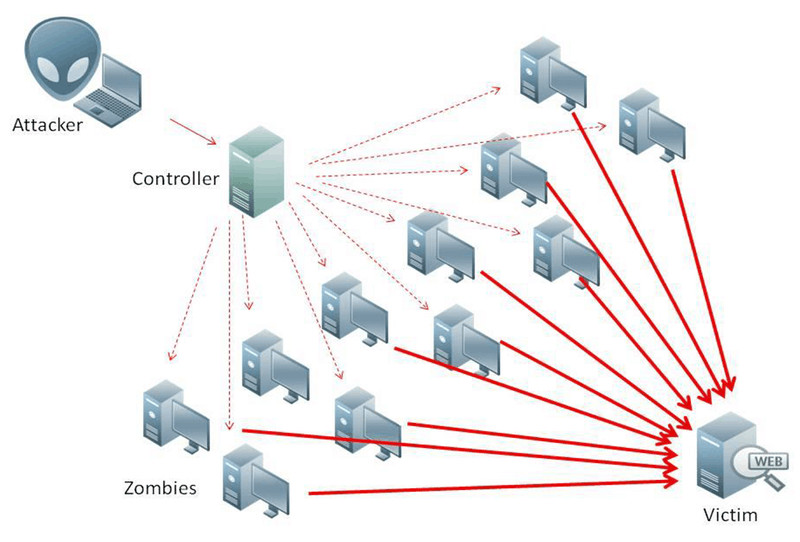Last Updated on October 19, 2017 by NandiNN
If you have a blog, you want others to be able to see it. That’s pretty much the point of having the blog, compared to a LiveJournal, which is only viewable by those you deem worthy. A blog should be online and viewable as often as possible; it’s your shop window, so you need your readership to be able to actually see it. Given the effort most professional bloggers put into spreading the name and URL of their blog far and wide, your blog being down renders a lot of that fine work completely useless.
Before we get started, we would love for you to join our growing Facebook group right here! You can also join our Pinterest group by scrolling to the bottom of this page! If you are looking for guest blogging opportunities or if you need a personal affordable coach to take you from A-Z, we can help you. Get all the juicy details right here! Have you seen our brand new shop!

We also wanted to take the opportunity to let you know that we use Affiliate links on some of our blog posts. This means that we could make a commission if you click on an affiliate link and purchase something.
Want to take your blog to the next level? Sign up below! If you do not have a blog yet and are thinking of starting one, sign up
Of course, blogs crash. It happens. A blip with your hosting server and your blog is suddenly inaccessible. Most of the time, these crashes are small and easy to manage– more often than not, you won’t have to do any managing of them at all. A few refreshes, your host will recover, and your blog is back online.
But what if it isn’t? What if what initially appeared to be a momentary blip, a run of the mill occurrence, lasts for longer than a few minutes? Understanding what’s going on is vital to getting your blog — and thus your income — back up and running. Below is an examination of the most common causes of blogs going down and, most importantly, what you can do to prevent them.
DDoS

What Is It?
A DDoS — which stands for direct denial of service — is a brute force attack on a specific IP address, which is often associated with a number of servers. If your blog is hosted on an affected server, then your blog will crash. The servers receive hundreds of thousands of requests in a few minutes; far more than your host is able to handle. When it can’t handle the attack, your blog crashes.
DDoS attacks are incredibly common, and some of the biggest sites online can still fall victim to them.
How Long Does It Last For?
Anything from a few minutes to potentially days; it all depends on how quickly your host is able to respond. You should get in touch with your host as quickly as possible to ensure they know they have an issue.
How Can It Be Prevented?
It’s often best to purchase your own server and use managed security to take care of the technical protections you will need. Shared hosting is fine if you’re running a smaller hobby blog, but if you’re taking your blog pro, then you need your own space online. If you don’t, then the details of the viewers who comment on your blog as well as the blog itself could be at permanent risk of damage.
Violating Your Hosts Terms of Service
What Is It?
When you buy a server, hosting space, or even just a domain name, there are terms of use you have to abide by. Chances are you don’t really know what these are; most of us just tick a box to say we agree, without ever actually checking through the fine print.
If you violate these terms of use, then your host or name provider has the right to pull your site offline. It’s unlikely that you will violate these terms accidentally, but one area you do have to be very careful of is accidental plagiarism. Plagiarism is banned by most hosts, and if informed of it, they can and will take your site offline. Make sure you’re never copying the work of another site, and don’t publish an image unless you’re certain you have permission to.
How Long Does It Last For?
As long as it takes you to resolve the issue with your host. Unless you are hosting malicious content, it’s unlikely that you will lose the blog forever, but you will be required to remove any content that violates terms of service.
How Can It Be Prevented?
Read the fine print! It really is that simple. Your blog is important; it’s an income stream, so don’t take any chances– read the fine print to make sure you’re never at risk of violating any of the terms.
Plugin Errors

What Is It?
If you use WordPress, you’ll be familiar with the plugins you can use to enhance your blog. Most of the time, you will be able to forget that these plugins even exist– but they do have the potential to crash your entire blog. A faulty plugin can bring the entire site down; instead of your blog’s front page, viewers will just see an incomprehensible line of code in its place.
How Long Does It Last For?
As long as it takes for you to find the faulty plugin and disable it. This can be more difficult than it sounds; often, you will find the faulty plugin also denies you the ability to access your WordPress Admin. Thankfully, there are workarounds that allow you to fix the problem, though it might take you awhile to get to grips with what you need to do.
How Can It Be Prevented?
Don’t allow plugins to auto-update, even if that seems like it would make your life easier. Manually update your plugins one at a time; that way, if an update has a problem, you will instantly know which plugin is the cause of the issue. Schedule reminders so that you never miss an update; failing to update could cause a problem in and of itself.
Traffic Spike
What Is It?
If a post you have written goes viral or you begin a new marketing campaign, your blog can be visited by more visitors than it can handle. In its way, this is a good thing– though it won’t feel like it at the time! It’s effectively a natural DDoS.
How Long Does It Last For?
Speak to your host to help calm the problem as soon as you notice it, but for the most part, things will return to normal when the traffic begins to recede.
How Can It Be Prevented?
It’s worth checking what your blog can currently withstand and potentially upgrading your hosting or servers prior to any big marketing pushes. However, a sudden spike of visitors can happen organically, so you can’t always be 100 percent prepared for them. Just do your best to solve the problem when you notice it occurring.
Keeping your blog online is vital for it to succeed as a business. By putting the preventative measures as detailed above into place, you can be confident that your blog will always be there for any viewers who seek it. Since switching to Siteground, my blog is always online and runs really well. I did a whole review here!
If you enjoyed our blog we would like to have you join our email list and receive weekly money-making tips, you can join now! Don’t forget to join our Private Facebook group. The page is created to share your work, pitch your services and learn from other experienced bloggers!
***We would like to note that this post and most posts on our blog may contain affiliate links. This means that if you purchase something that has an affiliate link, we will get a commission from it. Not all items recommended on our site are affiliate links. We only recommend items that we have used and tried. These items have brought us much success and we highly recommend them to you in order to be successful. Thank you for your trust!

Pug Puppies for Sale Near Me
pugs puppies for sale
teacup pugs for sale
pug puppies for sale by owner
pug puppies ohio
PUG PUPPY FOR SALE NEAR ME
PUG PUPPIES FOR SALE
pug puppies for sale in kentucky
Pug Puppies for Sale Under $500 Near Me
pug puppies for sale in texas
pug puppies for sale $200
pugs for sale near me under $500
pugs for sale under $400 near me
pugs for sale near me
puppies for sale near me under $500
pug puppies for sale under $1,000 near me
pug for sale
pug puppies for sale under $300
Brindle Pug
Pitbull Pug Mix
Pugs for sale cheap
Cheap pug
affordable pug puppies for sale near me
black pugs for sale near me
White Pugs for sale
pug dog for sale
free pug puppies
pug puppies for sale in my area
mn pug breeders
pug puppies indiana
pugs for sale michigan
USA
USA
USA
USA
USA
USA
USA
USA
USA
USA
USA
USA
USA
USA
USA
USA
USA
USA
USA
PUG PUPPY ADOPTION
Pug puppies for sale
Pug puppies for sale near me
Pug puppies near me
Pug Puppies for Sale Under $500 Near Me
Cute Pug Puppies
Black pug puppies
Black pug puppies for sale
pug puppies for adoption
black pug puppies for sale near me
chihuahua pug mix puppies
how much is a pug puppy
teacup pug puppies
baby pug puppies
baby pug puppies for sale
pictures of pug puppies
pug puppies for sale in Ohio
pug puppies price
pug mix puppies
teacup pug puppies for sale
best food for pug puppy
newborn pug puppies
pug puppies craigslist
pug puppies for sale craigslist
adorable pug puppies
how much does a pug puppy cost
Pitbull pug mix puppies
pug pit mix puppy
pug puppies for sale $200
pug puppies for sale in NJ
Pug puppies for sale in Wisconsin
pug puppy cost
pug puppy food
royal canin pug puppy
royal canin pug puppy food
fawn pug puppy
pug puppies for sale florida
pug puppies for sale in Indiana
pug puppies for sale in KY
pug puppies for sale in NC
pug dog puppy
AKC Registered Pug Puppies For sale
cheap pug puppies for sale near me
cheap pug puppies for sale in California
cheap pug puppies for sale in nj
Black Pug Puppies for sale
pugs puppies for sale
USA
USA
USA
USA
USA
USA
USA
USA
USA
USA
USA
USA
USA
USA
USA
USA
USA
USA
USA
USA
USA
USA
USA
USA
USA
USA
USA
USA
USA
USA
USA
USA
USA
USA
USA
USA
USA
USA
USA
USA
USA
USA
USA
USA
USA
USA
USA
USA
USA
USA
USA
USA
USA
USA
USA
USA
USA
USA
USA
USA
USA
USA
USA
USA
USA
USA
USA
USA
USA
USA
USA
USA
USA
USA
USA
USA
USA
USA
USA
USA
USA
USA
USA
USA
USA
USA
USA
USA
USA
USA
USA
USA
USA
USA
USA
USA
USA
USA
USA
USA
USA
USA
USA
USA
USA
USA
USA
USA
USA
USA
USA
USA
USA
USA
USA
USA
USA
USA
USA
USA
USA
USA
USA
USA
USA
USA
USA
USA
USA
USA
USA
USA
USA
USA
USA
USA
USA
USA
USA
USA
USA
USA
USA
USA
USA
USA
USA
USA
USA
USA
USA
USA
USA
USA
USA
USA
USA
USA
USA
USA
USA
USA
USA
USA
USA
USA
USA
USA
USA
USA
USA
USA
USA
USA
USA
USA
USA
USA
USA
USA
USA
USA
USA
USA
USA
USA
USA
USA
USA
USA
USA
USA
USA
USA
USA
USA
USA
USA
USA
USA
USA
USA
USA
USA
USA
USA
USA
USA
USA
USA
USA
USA
USA
USA
USA
USA
USA
USA
USA
USA
USA
USA
USA
USA
USA
USA
USA
USA
USA
USA
USA
USA
USA
USA
USA
USA
USA
USA
USA
USA
USA
USA
USA
USA
USA
USA
USA
USA
USA
USA
USA
USA
USA
USA
USA
USA
USA
USA
USA
USA
USA
USA
USA
USA
USA
USA
USA
USA
USA
USA
USA
USA
USA
USA
USA
USA
USA
USA
USA
USA
USA
USA
USA
USA
USA
USA
USA
USA
USA
USA
USA
USA
USA
USA
USA
USA
USA
USA
USA
USA
USA
USA
USA
USA
USA
USA
USA
USA
USA
USA
USA
USA
USA
USA
USA
USA
USA
USA
USA
USA
USA
USA
USA
USA
USA
USA
USA
USA
USA
USA
USA
USA
USA
USA
USA
USA
USA
USA
USA
USA
USA
USA
USA
USA
USA
USA
USA
Good afternoon to all friends. I want to give you a tip that today there are just a lot of good casinos that you can play on the website unitedarabcasinos. There all new players are given a huge bonus at the start you can spend it on the game.
Pug pups for sale are utterly gorgeous, affectionate, and intelligent. Excellent pedigrees, gorgeous coats, finely formed ears, a tight, curled tail, outstanding faces, and a superb conformation like their parents are all present in these puppies. The parents are both in wonderful health and are kind and devoted family members. They will arrive fully registered with the AKC, with pedigree papers, and with a one-year health guarantee.
Pug Puppies for Sale Near Me
pugs puppies for sale
teacup pugs for sale
pug puppies for sale by owner
pug puppies ohio
PUG PUPPY FOR SALE NEAR ME
PUG PUPPIES FOR SALE
pug puppies for sale in kentucky
Pug Puppies for Sale Under $500 Near Me
pug puppies for sale in texas
pug puppies for sale $200
pugs for sale near me under $500
pugs for sale under $400 near me
pugs for sale near me
puppies for sale near me under $500
pug puppies for sale under $1,000 near me
pug for sale
pug puppies for sale under $300
Brindle Pug
Pitbull Pug Mix
Pugs for sale cheap
Cheap pug
affordable pug puppies for sale near me
black pugs for sale near me
White Pugs for sale
pug dog for sale
free pug puppies
pug puppies for sale in my area
mn pug breeders
pug puppies indiana
pugs for sale michigan
PUG PUPPY ADOPTION
Pug puppies for sale
Pug puppies for sale near me
Pug puppies near me
Pug Puppies for Sale Under $500 Near Me
Cute Pug Puppies
Black pug puppies
Black pug puppies for sale
pug puppies for adoption
black pug puppies for sale near me
chihuahua pug mix puppies
how much is a pug puppy
teacup pug puppies
baby pug puppies
pictures of pug puppies
pug puppies for sale in Ohio
pug puppies price
pug mix puppies
teacup pug puppies for sale
best food for pug puppy
newborn pug puppies
pug puppies craigslist
pug puppies for sale craigslist
adorable pug puppies
how much does a pug puppy cost
Pitbull pug mix puppies
pug pit mix puppy
pug puppies for sale $200
pug puppies for sale in NJ
Pug puppies for sale in Wisconsin
pug puppy cost
pug puppy food
royal canin pug puppy
royal canin pug puppy food
fawn pug puppy
pug puppies for sale florida
pug puppies for sale in Indiana
pug puppies for sale in KY
pug puppies for sale in NC
pug dog puppy
AKC Registered Pug Puppies For sale
cheap pug puppies for sale near me
cheap pug puppies for sale in California
cheap pug puppies for sale in nj
Black Pug Puppies for sale
pugs puppies for sale
https://www.gamja888.com/ – 바카라사이트,카지노사이트,카지노게임사이트,온라인바카라,온라인카지노,Gamja888
https://gamja888.com/ – 퀸즈슬롯
https://gamja888.com/ – 맥스카지노
https://gamja888.com/ – 비바카지노
https://gamja888.com/ – 카지노주소
https://gamja888.com/ – 바카라추천
https://gamja888.com/ – 온라인바카라게임
https://gamja888.com/ – 안전한 바카라사이트
https://gamja888.com/ – 바카라
https://gamja888.com/ – 카지노
https://gamja888.com/ – 퀸즈슬롯 카지노
https://gamja888.com/ – 바카라게임사이트
https://gamja888.com/onlinebaccarat/ – 온라인바카라
https://gamja888.com/millionclubcasino/ – 밀리언클럽카지노
https://gamja888.com/safecasinosite/ – 안전카지노사이트
https://gamja888.com/baccaratsiterecommendation/ – 바카라사이트추천
https://gamja888.com/ourcasino/ – 우리카지노계열
https://gamja888.com/slotmachine777/ – 슬롯머신777
https://gamja888.com/royalcasinosite/ – 로얄카지노사이트
https://gamja888.com/crazyslot/ – 크레이지슬롯
https://gamja888.com/onlineblackjack/ – 온라인블랙잭
https://gamja888.com/internetroulette/ – 인터넷룰렛
https://gamja888.com/casinoverificationsite/ – 카지노검증사이트
https://gamja888.com/safebaccaratsite/ – 안전바카라사이트
https://gamja888.com/mobilebaccarat/ – 모바일바카라
https://gamja888.com/howtowin-baccarat/ – 바카라 필승법
https://gamja888.com/meritcasino/ – 메리트카지노
https://gamja888.com/baccarat-howto/ – 바카라 노하우
youube.me
instagrme.com
youubbe.me
Instagrm.me
Instagrme.net
internetgame.me
instagrme.live
naverom.me
facebokom.me
https://www.instagrme.com/ – 바카라사이트,우리카지노,온라인바카라,카지노사이트,실시간바카라
https://instagrme.com/ – 퀸즈슬롯
https://instagrme.com/ – 바카라게임
https://instagrme.com/ – 카지노주소
https://instagrme.com/ – 온라인카지노
https://instagrme.com/ – 온라인카지노사이트
https://instagrme.com/ – 바카라게임사이트
https://instagrme.com/ – 실시간바카라사이트
https://instagrme.com/ – 바카라
https://instagrme.com/ – 카지노
https://instagrme.com/woori-casino/ – 우리카지노
https://instagrme.com/theking-casino/ – 더킹카지노
https://instagrme.com/sands-casino/ – 샌즈카지노
https://instagrme.com/yes-casino/ – 예스카지노
https://instagrme.com/coin-casino/ – 코인카지노
https://instagrme.com/thenine-casino/ – 더나인카지노
https://instagrme.com/thezone-casino/ – 더존카지노
https://instagrme.com/casino-site/ – 카지노사이트
https://instagrme.com/gold-casino/ – 골드카지노
https://instagrme.com/evolution-casino/ – 에볼루션카지노
https://instagrme.com/casino-slotgames/ – 카지노 슬롯게임
https://instagrme.com/baccarat/ – baccarat
https://instagrme.com/texas-holdem-poker/ – 텍사스 홀덤 포카
https://instagrme.com/blackjack/ – blackjack
youube.me
gamja888.com
youubbe.me
Instagrm.me
Instagrme.net
internetgame.me
instagrme.live
naverom.me
facebokom.me
https://www.youubbe.me/ – 카지노사이트,바카라사이트,슬롯사이트,온라인카지노,카지노주소
https://youubbe.me/ – 카지노검증사이트
https://youubbe.me/ – 안전한카지노사이트
https://youubbe.me/ – 슬롯카지노
https://youubbe.me/ – 바카라게임
https://youubbe.me/ – 카지노추천
https://youubbe.me/ – 비바카지노
https://youubbe.me/ – 퀸즈슬롯
https://youubbe.me/ – 카지노
https://youubbe.me/ – 바카라
https://youubbe.me/ – 안전한 바카라사이트
https://youubbe.me/ – 온라인슬롯
https://youubbe.me/casinosite/ – 카지노사이트
https://youubbe.me/baccarat/ – 바카라
https://youubbe.me/baccaratsite/ – 바카라사이트
https://youubbe.me/pharaoh-casino/ – 파라오카지노
https://youubbe.me/제왕카지노/ – 제왕카지노
https://youubbe.me/mgm카지노/ – mgm카지노
https://youubbe.me/theking-casino/ – 더킹카지노
https://youubbe.me/coin-casino/ – 코인카지노
https://youubbe.me/solaire-casino/ – 솔레어카지노
https://youubbe.me/casino-game/ – 카지노게임
https://youubbe.me/micro-gaming/ – 마이크로게이밍
https://youubbe.me/asia-gaming/ – 아시아게이밍
https://youubbe.me/taisan-gaming/ – 타이산게이밍
https://youubbe.me/oriental-game/ – 오리엔탈게임
https://youubbe.me/evolution-game/ – 에볼루션게임
https://youubbe.me/dragon-tiger/ – 드래곤타이거
https://youubbe.me/dream-gaming/ – 드림게이밍
https://youubbe.me/vivo-gaming/ – 비보게이밍
youube.me
gamja888.com
instagrme.com
Instagrm.me
Instagrme.net
internetgame.me
instagrme.live
naverom.me
facebokom.me
https://www.youube.me/ – 카지노사이트,바카라사이트,바카라게임사이트,온라인바카라,인터넷카지노
https://youube.me/ – 퀸즈슬롯
https://youube.me/ – 카지노주소
https://youube.me/ – 비바카지노
https://youube.me/ – 카지노추천
https://youube.me/ – 카지노게임
https://youube.me/ – 온라인카지노사이트
https://youube.me/ – 카지노
https://youube.me/ – 바카라
https://youube.me/ – 온라인카지노
https://youube.me/ – 카지노게임사이트
https://youube.me/sandscasinoaddress/ – 카지노검증사이트
https://youube.me/royalcasinoseries/ – 로얄카지노계열
https://youube.me/slotmachinesite/ – 슬롯머신사이트
https://youube.me/maxcasino/ – 맥스카지노
https://youube.me/baccaratgamesite/ – 바카라게임사이트
https://youube.me/casimbakorea-casino/ – 카심바코리아 카지노
https://youube.me/mobilecasino/ – 모바일카지노
https://youube.me/real-timebaccarat/ – 실시간바카라
https://youube.me/livecasino/ – 라이브카지노
https://youube.me/onlineslots/ – 온라인슬롯
https://youube.me/sandscasinoaddress/ – 바카라 이기는방법
https://youube.me/safecasinosite/ – 안전카지노사이트
https://youube.me/ourcasinosite/ – 우리카지노사이트
https://youube.me/sandscasinoaddress/ – 샌즈카지노주소
https://youube.me/baccarat-rulesofthegame/ – 바카라 게임규칙
https://youube.me/baccarat-howtoplay/ – 바카라 게임방법
gamja888.com
instagrme.com
youubbe.me
Instagrm.me
Instagrme.net
internetgame.me
instagrme.live
naverom.me
facebokom.me
Hi there, I enjoy reading through your article. I wanted to write a little comment to
support you.